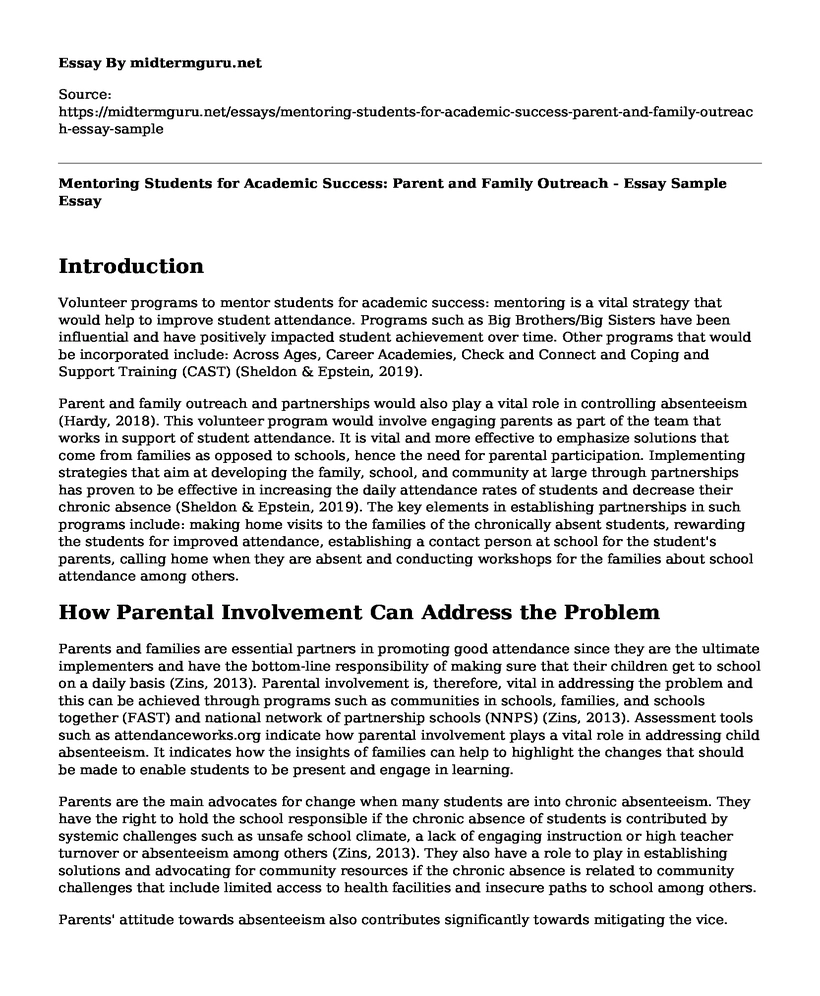Introduction
Volunteer programs to mentor students for academic success: mentoring is a vital strategy that would help to improve student attendance. Programs such as Big Brothers/Big Sisters have been influential and have positively impacted student achievement over time. Other programs that would be incorporated include: Across Ages, Career Academies, Check and Connect and Coping and Support Training (CAST) (Sheldon & Epstein, 2019).
Parent and family outreach and partnerships would also play a vital role in controlling absenteeism (Hardy, 2018). This volunteer program would involve engaging parents as part of the team that works in support of student attendance. It is vital and more effective to emphasize solutions that come from families as opposed to schools, hence the need for parental participation. Implementing strategies that aim at developing the family, school, and community at large through partnerships has proven to be effective in increasing the daily attendance rates of students and decrease their chronic absence (Sheldon & Epstein, 2019). The key elements in establishing partnerships in such programs include: making home visits to the families of the chronically absent students, rewarding the students for improved attendance, establishing a contact person at school for the student's parents, calling home when they are absent and conducting workshops for the families about school attendance among others.
How Parental Involvement Can Address the Problem
Parents and families are essential partners in promoting good attendance since they are the ultimate implementers and have the bottom-line responsibility of making sure that their children get to school on a daily basis (Zins, 2013). Parental involvement is, therefore, vital in addressing the problem and this can be achieved through programs such as communities in schools, families, and schools together (FAST) and national network of partnership schools (NNPS) (Zins, 2013). Assessment tools such as attendanceworks.org indicate how parental involvement plays a vital role in addressing child absenteeism. It indicates how the insights of families can help to highlight the changes that should be made to enable students to be present and engage in learning.
Parents are the main advocates for change when many students are into chronic absenteeism. They have the right to hold the school responsible if the chronic absence of students is contributed by systemic challenges such as unsafe school climate, a lack of engaging instruction or high teacher turnover or absenteeism among others (Zins, 2013). They also have a role to play in establishing solutions and advocating for community resources if the chronic absence is related to community challenges that include limited access to health facilities and insecure paths to school among others.
Parents' attitude towards absenteeism also contributes significantly towards mitigating the vice. This is the case because:
- Parents should always want a better life for their children and often view high school graduation as an appropriate key.
- They are required to make the connection between attendances from elementary to middle school until graduation. They should always be strict with education as the child proceeds with studies (Hardy, 2018).
- They should be worried even when the child skips school with excused absences for family visits and illness among others.
- They understand that consecutive absences can affect a child's academics as well as sporadic absences that occur either once or twice a month (Zins, 2013).
- It is vital for parents to see the connection between children's attendance and their future aspirations and understand that their children's education is a community-wide concern. It is, therefore, important to recognize and debunk any existing misconceptions held by the community to work towards a beneficial educational culture.
References
Carlson, B. (2019).The effects of chronic absenteeism. Isd423.org. Retrieved from http://www.isd423.org/vidoc/chronic-absenteeism/
Hardy, D. (2018). 8 ways to prevent chronic absenteeism. Educationdrive.com. Retrieved from https://www.educationdive.com/news/8-ways-to-prevent-chronic-absenteeism/527794/
Sheldon, S. and Epstein, J. (2019). Getting students to school: Using family and community involvement to reduce chronic absenteeism. Adi.org. Retrieved from http://www.adi.org/journal/fw04/Sheldon%20&%20Epstein.pdf
Zins, C. (2013). Engaging families to prevent chronic truancy. Sophia.stkate.edu. Retrieved from https://sophia.stkate.edu/cgi/viewcontent.cgi?article=1280&context=msw_papers
Cite this page
Mentoring Students for Academic Success: Parent and Family Outreach - Essay Sample. (2023, Jan 25). Retrieved from https://midtermguru.com/essays/mentoring-students-for-academic-success-parent-and-family-outreach-essay-sample
If you are the original author of this essay and no longer wish to have it published on the midtermguru.com website, please click below to request its removal:
- First-Generation University Students: Motivation and Academic Success
- Is a College Education Worth It? - Argumentative Essay
- Research Paper on Local Organizations Currently Working Towards Social Change in Toronto
- Racial Divide: Survey Uncovers Deep Racial Discrimination in US - Essay Sample
- Early Childhood Interest in Law - Essay Sample
- Terrorism: US & Israel and Weakening of the Arab World - Essay Sample
- Feminism: Overcoming Male-Centric Society & Misconceptions - Essay Sample







